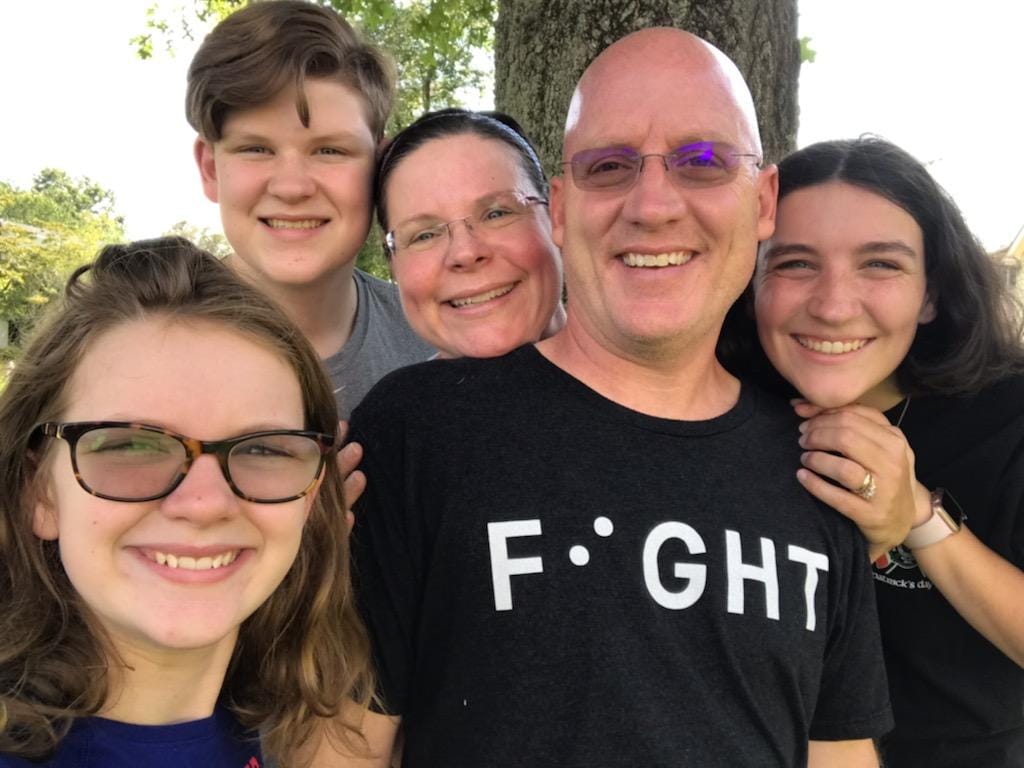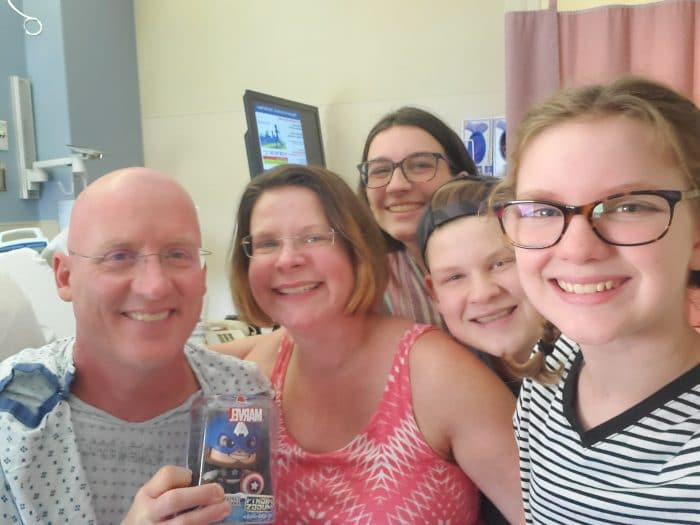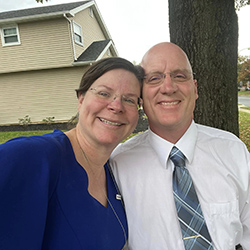Theresa Maschke
Caregiver |
Rectal - Stage III |
Age at Diagnosis: 47
My husband, Joe, was diagnosed with stage IIIb rectal cancer at age 47 in August 2018, following a colonoscopy. He is a firefighter, and at the time, he was a part-time iron worker. He was one of the healthiest people I knew: healthier than people 20 years younger than he was at that time.
Joe had been having signs or symptoms, rectal bleeding and at times constipation, but he believed he had internal hemorrhoids. He was becoming more concerned, so he went to his primary care who then referred him to a gastroenterologist in late July 2018. Joe is not a guy who goes to the doctor often, and yet he made and attended this appointment without me having a clue that anything was wrong.
His GI also believed Joe had internal hemorrhoids, but in an “abundance of caution,” he scheduled Joe for a colonoscopy. While the scheduling assistant was putting Joe on the calendar for a September colonoscopy, Joe’s GI came out and advised her to double book Joe for before his planned vacation for an August 14 colonoscopy, which she did.
Joe’s prep was brutal, and he was in a lot of pain. After his colonoscopy, I was called back to the recovery room (which should have been a clear sign something was wrong, but I didn’t realize it at the time), and I was joking with the nurse and Joe. His GI came in and whipped a three-sided curtain around us for privacy and said, “You have a tumor in your rectum, and it’s most likely cancer.” Joe and I cried, and I immediately whipped out a notebook to start writing things down. I knew I wouldn’t remember details we discussed because of the trauma of the news. I needed to document them. The nurse told us she would take notes. She told us to listen and ask questions.
The GI was fantastic. We received the worst news of our lives, and it was devastating.
I asked Joe’s GI, “Where would you send someone you love to be treated?” He didn’t have the surgeon’s name handy, but he called Joe that afternoon with the name of the surgeon, which we would use to build Joe’s treatment team.
Our kids were 15, 13, and 11 at the time. We told them immediately after the colonoscopy that Joe most likely had cancer. We cautioned them to not Google anything about it. We promised we would be transparent and share all news we received as we received it.
At 1am, I sent a DM to a nurse oncologist friend. I asked her “What do we do?” and “Where do we start?” She told me we needed bloodwork, scans, an a surgeon, oncologist, and radiologist. She was a tremendous help, especially as I felt devastated, overwhelmed, scared, and alone. Within a week, Joe had had bloodwork, scans, met his surgeon. Within 10 days, he had his team assembled and met with all of them. Within three weeks, Joe had his port installed and had his first chemotherapy treatment. Joe had 12 chemo infusions over about six months. He had 5FU. After about a month break, he had a month of radiation with chemo pill.
Finally in June 2019, Joe had surgery to remove his rectum. He received an ileostomy, and the thought of needing one both scared and disgusted him. I told him it was lifesaving and that he needed that ileostomy.
On July 2, 2019, Joe was declared no evidence of disease (NED). He had his reversal surgery toward the end of August 2019. Joe’s fast-moving GI saved his life. I am also very thankful for his treatment team who got him into so quickly and efficiently. They are lifesaving heroes.
I would love to say, “And we lived happily ever after.” But the fight never ends. Joe is now five-years cancer free, but the side effects of his rectal cancer and treatment will be with him for the rest of his life. He has LARS and neuropathy. We would like to believe he has a good 30 to 40 years of life ahead of him, but many days are really difficult. There is no “new normal.” There’s just learning to cope with the hand you’ve been given.
If you have blood in your poop or your bowl: Get the colonoscopy! Don’t wait weeks, months, or even years wishing symptoms away or “hoping it’s nothing.”
My personal experience is this: You would far prefer the 24 hours of being uncomfortable and inconvenienced by the colonoscopy prep than you would be undergoing chemotherapy, radiation, surgeries, and exams and constant monitoring for the rest of your life if you prolong getting symptoms checked. Side effects also last a lifetime.
Colorectal screening really does save lives.
Also, we were transparent with our kids. We did not want them Googling anything related to Joe’s diagnosis and treatment. Joe’s doctor’s told him, “We are treating Joe as an individual.” That’s what we told our kids. We didn’t want to think of Joe as a statistic, and I didn’t want anyone to mentally go down that path. We took one day at a time. After many sleepless nights, I handed the diagnosis over to God and said, “I know I have no control over this.” That was super difficult because I am a control freak, but also, it was very freeing because I knew I had zero control. But I kept a positive mindset. It was all I could do. I had to hold onto hope and believe “this too shall pass.”
This was a scary time in our lives. I made sure the kids had therapy and someone to talk to. I didn’t take good care of myself as a caregiver. I just put all my time and energy into everyone else and making sure they were OK, but the wheels were falling off this bus (me!). It’s really important that caregivers take care of themselves.
It wasn’t until a few years after Joe’s diagnosis that we realized the power of telling our story. One of the most gratifying life lessons we learned was through Fight CRC’s Advocacy Team. If it wasn’t for them, Joe and I would never have known we could have testified before both the New Jersey Senate and Assembly and the value of our story. Showing up in Trenton and telling our story helped pass the colorectal cancer screening bill into law. My daughter and I have also told our story to members of Congress at Call-on Congress for the past two years.
Something members of Congress need to know is that we need a dedicating research funding stream and research program (Congressionally Directed Medical Research Program) for colorectal cancer within the Department of Defense (DoD). Too much valuable research is being left on the table. Colorectal cancer is a devastating disease and without research, there aren’t additional treatment options. We need to fund researchers so they can make monumental and lifesaving progress in the fight against colorectal cancer.


Theresa Maschke
Caregiver |
Rectal - Stage III |
Age at Diagnosis: 47

My husband, Joe, was diagnosed with stage IIIb rectal cancer at age 47 in August 2018, following a colonoscopy. He is a firefighter, and at the time, he was a part-time iron worker. He was one of the healthiest people I knew: healthier than people 20 years younger than he was at that time.
Joe had been having signs or symptoms, rectal bleeding and at times constipation, but he believed he had internal hemorrhoids. He was becoming more concerned, so he went to his primary care who then referred him to a gastroenterologist in late July 2018. Joe is not a guy who goes to the doctor often, and yet he made and attended this appointment without me having a clue that anything was wrong.
His GI also believed Joe had internal hemorrhoids, but in an “abundance of caution,” he scheduled Joe for a colonoscopy. While the scheduling assistant was putting Joe on the calendar for a September colonoscopy, Joe’s GI came out and advised her to double book Joe for before his planned vacation for an August 14 colonoscopy, which she did.
Joe’s prep was brutal, and he was in a lot of pain. After his colonoscopy, I was called back to the recovery room (which should have been a clear sign something was wrong, but I didn’t realize it at the time), and I was joking with the nurse and Joe. His GI came in and whipped a three-sided curtain around us for privacy and said, “You have a tumor in your rectum, and it’s most likely cancer.” Joe and I cried, and I immediately whipped out a notebook to start writing things down. I knew I wouldn’t remember details we discussed because of the trauma of the news. I needed to document them. The nurse told us she would take notes. She told us to listen and ask questions.
The GI was fantastic. We received the worst news of our lives, and it was devastating.
I asked Joe’s GI, “Where would you send someone you love to be treated?” He didn’t have the surgeon’s name handy, but he called Joe that afternoon with the name of the surgeon, which we would use to build Joe’s treatment team.
Our kids were 15, 13, and 11 at the time. We told them immediately after the colonoscopy that Joe most likely had cancer. We cautioned them to not Google anything about it. We promised we would be transparent and share all news we received as we received it.
At 1am, I sent a DM to a nurse oncologist friend. I asked her “What do we do?” and “Where do we start?” She told me we needed bloodwork, scans, an a surgeon, oncologist, and radiologist. She was a tremendous help, especially as I felt devastated, overwhelmed, scared, and alone. Within a week, Joe had had bloodwork, scans, met his surgeon. Within 10 days, he had his team assembled and met with all of them. Within three weeks, Joe had his port installed and had his first chemotherapy treatment. Joe had 12 chemo infusions over about six months. He had 5FU. After about a month break, he had a month of radiation with chemo pill.
Finally in June 2019, Joe had surgery to remove his rectum. He received an ileostomy, and the thought of needing one both scared and disgusted him. I told him it was lifesaving and that he needed that ileostomy.
On July 2, 2019, Joe was declared no evidence of disease (NED). He had his reversal surgery toward the end of August 2019. Joe’s fast-moving GI saved his life. I am also very thankful for his treatment team who got him into so quickly and efficiently. They are lifesaving heroes.
I would love to say, “And we lived happily ever after.” But the fight never ends. Joe is now five-years cancer free, but the side effects of his rectal cancer and treatment will be with him for the rest of his life. He has LARS and neuropathy. We would like to believe he has a good 30 to 40 years of life ahead of him, but many days are really difficult. There is no “new normal.” There’s just learning to cope with the hand you’ve been given.
If you have blood in your poop or your bowl: Get the colonoscopy! Don’t wait weeks, months, or even years wishing symptoms away or “hoping it’s nothing.”
My personal experience is this: You would far prefer the 24 hours of being uncomfortable and inconvenienced by the colonoscopy prep than you would be undergoing chemotherapy, radiation, surgeries, and exams and constant monitoring for the rest of your life if you prolong getting symptoms checked. Side effects also last a lifetime.
Colorectal screening really does save lives.
Also, we were transparent with our kids. We did not want them Googling anything related to Joe’s diagnosis and treatment. Joe’s doctor’s told him, “We are treating Joe as an individual.” That’s what we told our kids. We didn’t want to think of Joe as a statistic, and I didn’t want anyone to mentally go down that path. We took one day at a time. After many sleepless nights, I handed the diagnosis over to God and said, “I know I have no control over this.” That was super difficult because I am a control freak, but also, it was very freeing because I knew I had zero control. But I kept a positive mindset. It was all I could do. I had to hold onto hope and believe “this too shall pass.”
This was a scary time in our lives. I made sure the kids had therapy and someone to talk to. I didn’t take good care of myself as a caregiver. I just put all my time and energy into everyone else and making sure they were OK, but the wheels were falling off this bus (me!). It’s really important that caregivers take care of themselves.
It wasn’t until a few years after Joe’s diagnosis that we realized the power of telling our story. One of the most gratifying life lessons we learned was through Fight CRC’s Advocacy Team. If it wasn’t for them, Joe and I would never have known we could have testified before both the New Jersey Senate and Assembly and the value of our story. Showing up in Trenton and telling our story helped pass the colorectal cancer screening bill into law. My daughter and I have also told our story to members of Congress at Call-on Congress for the past two years.
Something members of Congress need to know is that we need a dedicating research funding stream and research program (Congressionally Directed Medical Research Program) for colorectal cancer within the Department of Defense (DoD). Too much valuable research is being left on the table. Colorectal cancer is a devastating disease and without research, there aren’t additional treatment options. We need to fund researchers so they can make monumental and lifesaving progress in the fight against colorectal cancer.


"The only silver lining in the colorectal cancer diagnosis was the amazing community we would have not met otherwise."
Theresa Maschke
Caregiver |
Rectal - Stage III |
Age at Diagnosis: 47

My husband, Joe, was diagnosed with stage IIIb rectal cancer at age 47 in August 2018, following a colonoscopy. He is a firefighter, and at the time, he was a part-time iron worker. He was one of the healthiest people I knew: healthier than people 20 years younger than he was at that time.
Joe had been having signs or symptoms, rectal bleeding and at times constipation, but he believed he had internal hemorrhoids. He was becoming more concerned, so he went to his primary care who then referred him to a gastroenterologist in late July 2018. Joe is not a guy who goes to the doctor often, and yet he made and attended this appointment without me having a clue that anything was wrong.
His GI also believed Joe had internal hemorrhoids, but in an “abundance of caution,” he scheduled Joe for a colonoscopy. While the scheduling assistant was putting Joe on the calendar for a September colonoscopy, Joe’s GI came out and advised her to double book Joe for before his planned vacation for an August 14 colonoscopy, which she did.
Joe’s prep was brutal, and he was in a lot of pain. After his colonoscopy, I was called back to the recovery room (which should have been a clear sign something was wrong, but I didn’t realize it at the time), and I was joking with the nurse and Joe. His GI came in and whipped a three-sided curtain around us for privacy and said, “You have a tumor in your rectum, and it’s most likely cancer.” Joe and I cried, and I immediately whipped out a notebook to start writing things down. I knew I wouldn’t remember details we discussed because of the trauma of the news. I needed to document them. The nurse told us she would take notes. She told us to listen and ask questions.
The GI was fantastic. We received the worst news of our lives, and it was devastating.
I asked Joe’s GI, “Where would you send someone you love to be treated?” He didn’t have the surgeon’s name handy, but he called Joe that afternoon with the name of the surgeon, which we would use to build Joe’s treatment team.
Our kids were 15, 13, and 11 at the time. We told them immediately after the colonoscopy that Joe most likely had cancer. We cautioned them to not Google anything about it. We promised we would be transparent and share all news we received as we received it.
At 1am, I sent a DM to a nurse oncologist friend. I asked her “What do we do?” and “Where do we start?” She told me we needed bloodwork, scans, an a surgeon, oncologist, and radiologist. She was a tremendous help, especially as I felt devastated, overwhelmed, scared, and alone. Within a week, Joe had had bloodwork, scans, met his surgeon. Within 10 days, he had his team assembled and met with all of them. Within three weeks, Joe had his port installed and had his first chemotherapy treatment. Joe had 12 chemo infusions over about six months. He had 5FU. After about a month break, he had a month of radiation with chemo pill.
Finally in June 2019, Joe had surgery to remove his rectum. He received an ileostomy, and the thought of needing one both scared and disgusted him. I told him it was lifesaving and that he needed that ileostomy.
On July 2, 2019, Joe was declared no evidence of disease (NED). He had his reversal surgery toward the end of August 2019. Joe’s fast-moving GI saved his life. I am also very thankful for his treatment team who got him into so quickly and efficiently. They are lifesaving heroes.
I would love to say, “And we lived happily ever after.” But the fight never ends. Joe is now five-years cancer free, but the side effects of his rectal cancer and treatment will be with him for the rest of his life. He has LARS and neuropathy. We would like to believe he has a good 30 to 40 years of life ahead of him, but many days are really difficult. There is no “new normal.” There’s just learning to cope with the hand you’ve been given.
If you have blood in your poop or your bowl: Get the colonoscopy! Don’t wait weeks, months, or even years wishing symptoms away or “hoping it’s nothing.”
My personal experience is this: You would far prefer the 24 hours of being uncomfortable and inconvenienced by the colonoscopy prep than you would be undergoing chemotherapy, radiation, surgeries, and exams and constant monitoring for the rest of your life if you prolong getting symptoms checked. Side effects also last a lifetime.
Colorectal screening really does save lives.
Also, we were transparent with our kids. We did not want them Googling anything related to Joe’s diagnosis and treatment. Joe’s doctor’s told him, “We are treating Joe as an individual.” That’s what we told our kids. We didn’t want to think of Joe as a statistic, and I didn’t want anyone to mentally go down that path. We took one day at a time. After many sleepless nights, I handed the diagnosis over to God and said, “I know I have no control over this.” That was super difficult because I am a control freak, but also, it was very freeing because I knew I had zero control. But I kept a positive mindset. It was all I could do. I had to hold onto hope and believe “this too shall pass.”
This was a scary time in our lives. I made sure the kids had therapy and someone to talk to. I didn’t take good care of myself as a caregiver. I just put all my time and energy into everyone else and making sure they were OK, but the wheels were falling off this bus (me!). It’s really important that caregivers take care of themselves.
It wasn’t until a few years after Joe’s diagnosis that we realized the power of telling our story. One of the most gratifying life lessons we learned was through Fight CRC’s Advocacy Team. If it wasn’t for them, Joe and I would never have known we could have testified before both the New Jersey Senate and Assembly and the value of our story. Showing up in Trenton and telling our story helped pass the colorectal cancer screening bill into law. My daughter and I have also told our story to members of Congress at Call-on Congress for the past two years.
Something members of Congress need to know is that we need a dedicating research funding stream and research program (Congressionally Directed Medical Research Program) for colorectal cancer within the Department of Defense (DoD). Too much valuable research is being left on the table. Colorectal cancer is a devastating disease and without research, there aren’t additional treatment options. We need to fund researchers so they can make monumental and lifesaving progress in the fight against colorectal cancer.


"The only silver lining in the colorectal cancer diagnosis was the amazing community we would have not met otherwise."
Share this Story!




